California Company Tracks Recycling
BY KPI-JCI, Astec Mobile Screens
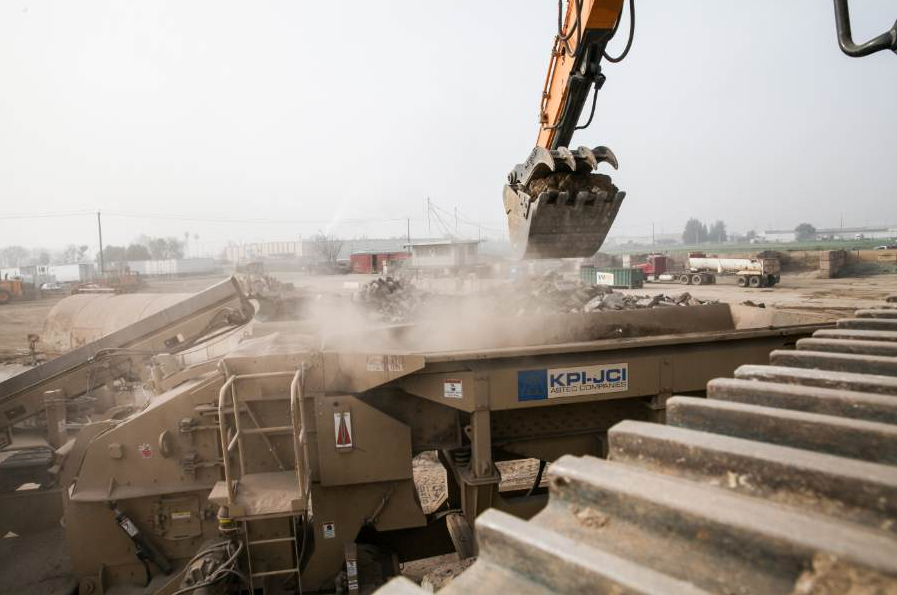
It was a sunny California day when Tyke Van Zandt first began putting iron to the test using nothing but a massive pile of crushed concrete. Over the course of a month, Van Zandt methodically tested all of the major players in the impact crushing game. Each manufacturer got one week to demonstrate its productivity, ease of maintenance, user-friendliness and service capabilities. Using nearly-identical test conditions—including weather, temperature, material and operator—Van Zandt set out determined to find the best track-mounted impact crusher for his money.
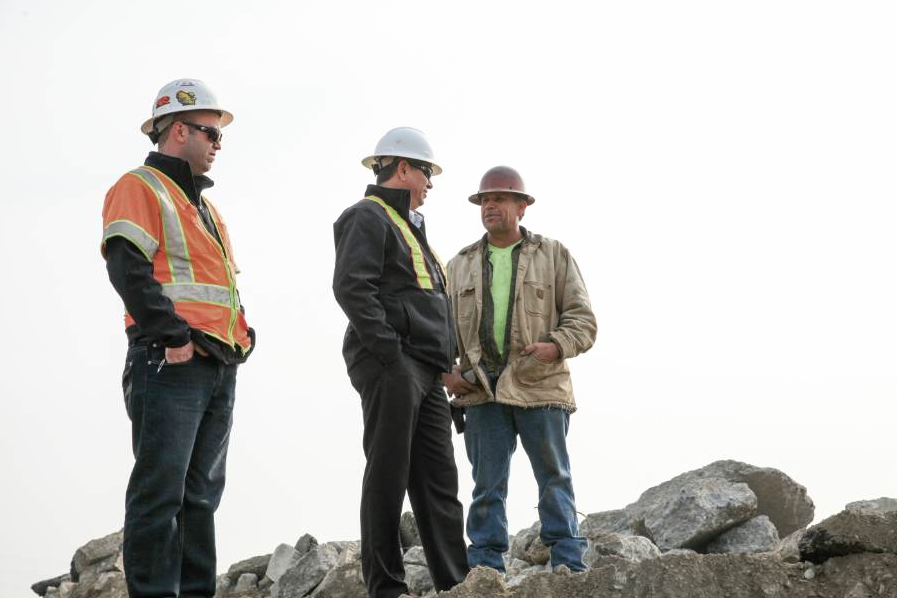
John Harper, outside equipment sales representative for Goodfellow Corporation, arranged for an FT4250CC to come on site and demonstrate its performance for Tyke Van Zandt and other management at FTG Construction Materials.
Van Zandt is the operations manager for FTG Construction Materials in Lodi, California, and already had one brand in his mind that had intrigued him for some time. All down the Golden State’s I-5 freeway, most major contractors were crushing on the fly with Fast Trax FT4250 impact crushers from KPI-JCI and Astec Mobile Screens, Yankton, South Dakota. He was curious why this particular track-mounted impactor seemed so popular.
“It’s the old adage, 1,000 flies can’t be wrong,” Van Zandt said. “I told my boss to drive up the I-5 and see what crushers are out there. All he saw were FT4250s—there are five within 10 miles. I asked, why…would we want to buy anything else?
“But I still had to do my homework and check.”
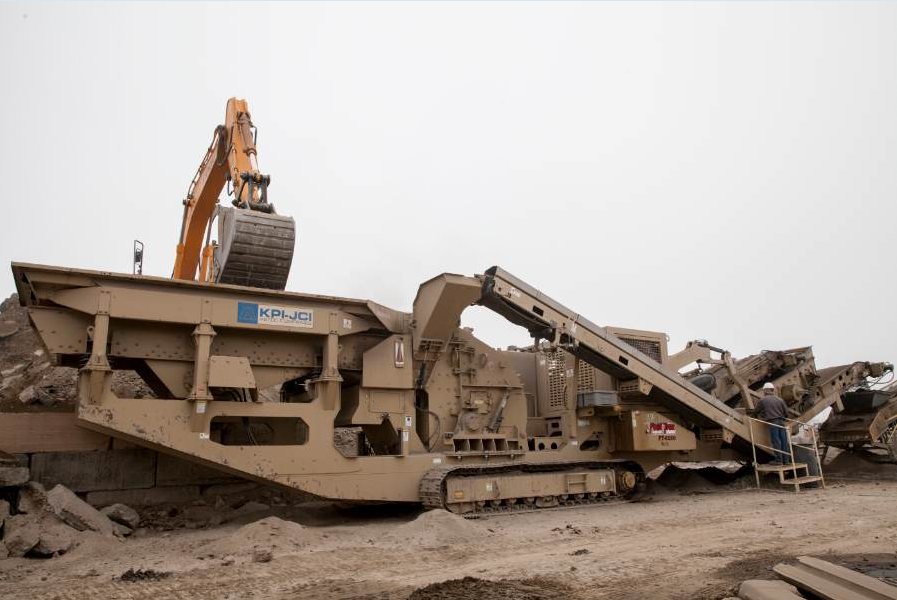
Step 1. Trucks bring the material to the site and dump it in a central location at the site. Step 2. A loader and/or dozer spread the material out. Step 3. An operator uses a breaker to reduce the material to 2-foot x 2-foot-minus pieces, and workers remove visible rebar, wood, metal and plastic by hand. Step 4. Processed material is piled and fed to the crusher using an excavator as shown in the picture here. Step 5. The crusher reduces the material to one of two sizes: a Class 2 road base, and a Class 3 backfill fine material for underground contractors. Photos courtesy KPI-JCI and Astec Mobile Screens, Yankton, South Dakota.
FTG Pioneers California’s Recycling
Formally founded in 1981, FTG Construction Materials is a corporate spin-off of Alegre Trucking. Alegre Trucking, which began in 1964, is the number one bulk transportation company for northern California and the Bay Area. FTG Construction Materials was born when the founder of Alegre Trucking, Frank C. Alegre, decided he wanted to try his hand at producing his own material rather than purchasing from a contractor.
“Frank saw all of the old concrete and asphalt on the side of the roads and wondered if he could crush it and make a product,” Van Zandt said. “He successfully managed to make it compatible with Class 2 specifications for California and became the first contractor to sell recycled road base in the state of California.”
Frank Alegre began crushing recycled materials including concrete, asphalt and ballast using a Sandvik horizontal shaft impactor, as well as custom crushing road base using a variety of jaw crushers, cone crushers, roll crushers and screens. The company continued to grow over the years, and today FTG Construction Materials employs nearly 50 associates and owns three pits in a 60-mile radius, located in Stockton, Lodi and Antioch.
The company crushes approximately 375,000 tons of recycled materials from roads, bridges, buildings and other projects each year using the FT4250 along with a Kolberg conveyor. Material is processed similarly at each site. The material is first trucked in from surrounding communities, dumped into a central location and then spread out by a loader or dozer. Using a breaker, the material is reduced to a 2-foot x 2-foot-minus size, then any visible rebar is removed, along with foreign material like wood, metal and plastic. After the garbage is removed by hand, the processed material is piled and fed to the crusher using an excavator. By using an excavator instead of a loader, the operator is able to see what is being fed to the crusher and remove it before it can be processed. Once the material has been processed, it is then stockpiled in two sizes: a Class 2 road base, and a Class 3 backfill fine material sold to underground contractors.
Although it’s an extensive process to prep the material for the crusher, it’s crucial, Van Zandt said.
The company’s biggest challenge is separating garbage from the recycled material, as it can have a detrimental effect on the final product and on wear components within the unit.
“When you’re crushing, the crusher will typically have a magnet on it, which will pull out metal, but it won’t pull out wood or plastic,” he said. “Metal must be kept to a very minimum, because it is extremely hard on blow bars, wear plates and belting. Wood is your second worst enemy. It will cut a belt, and when it splinters, your product no longer meets spec. If it’s a chunk of plastic, that’s no big deal as you can generally see it and pull it out, but if it’s visqueen [a polyethylene plastic sheeting], it will wrap itself around everything that moves and eventually stop everything if you don’t clean it.
“Your main goal is to avoid feeding the crusher anything it wasn’t designed to eat.”
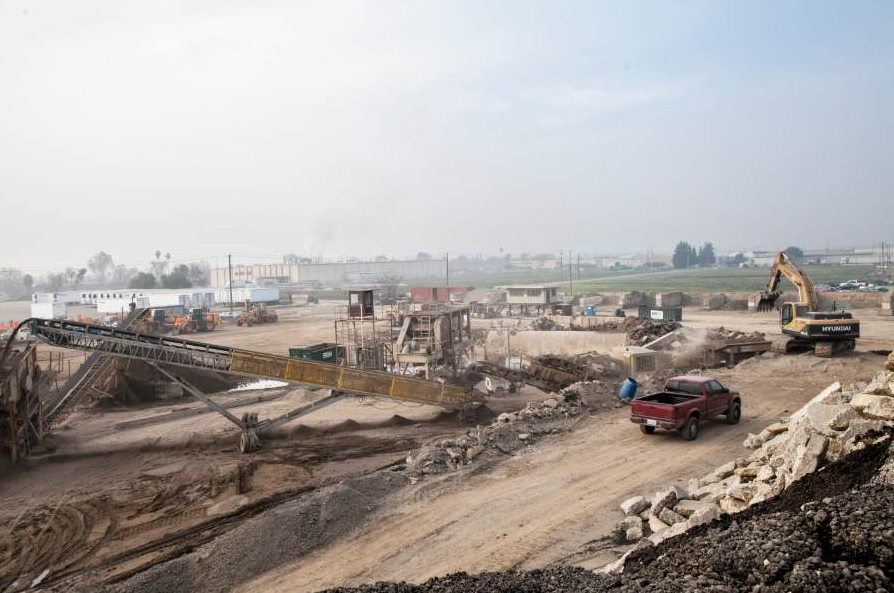
FTG Construction Materials, Lodi, California, crushes about 375,000 tons of recycled materials from roads, bridges, buildings and other projects each year using its FT4250 along with a Kolberg conveyor.
Make the Grade
Van Zandt, who has managed FTG Construction Materials since 2000, first began to seriously consider purchasing an FT4250 after hiring a local contractor who owned one.
“After watching his run, I was very impressed, and so I tried to get my company to buy one,” Van Zandt said.
The FT4250 features an Andreas-style impact crusher with a 3- or 4-bar MPR rotor and comes standard with Overload Protection System. The track plant is equipped with a 6-foot x 12-foot, two-deck screen, the largest screen in its class, which provides up to 50 percent more capacity than comparable models. The FT4250 is part of the continuous crushing and tracking impactor family of products, exclusively manufactured by KPI-JCI and Astec Mobile Screens. This allows contractors to crush and track at the same time.
Before investing in a new plant, Van Zandt had to run the numbers and see which made the most financial sense for the company. FTG Construction Materials reached out to Goodfellow Corporation, an authorized dealer for KPI-JCI and Astec Mobile Screens with locations in Nevada, Utah and Southern California. John Harper, outside equipment sales representative for Goodfellow, arranged for an FT4250CC to come on site and demonstrate its performance. At the same time, FTG Construction Materials tested track-mounted units from other OEMs as well.
There were several factors to which Van Zandt paid close attention during the demo phase, including the plant’s dust suppression system, production and price tag. Overall, the machines compared very similarly to each other, with only approximately 5 percent variance in average production and insignificant differences in cost.
The key differences among the models concerned ease of maintenance, dealer and factory support, user-friendliness and remote-control adjust capabilities, Van Zandt said.
Unlike other impact crushers on the market, the FT4250’s crusher housing hydraulically opens over the center for safe and easy access for maintenance. This is crucial when it comes to routine maintenance, like changing blow bars and wear plates, Van Zandt said.
“Some of the other crushers that we tested are simply made to produce, not to be worked on,” he said.
“The FT4250 was by far the easiest to perform maintenance on and I preferred it the most. The crusher box on the FT4250 is only 2 ½ feet off the ground, whereas most competitors are 6 to 8 feet off the ground. It’s a safety issue for us, since you’re climbing much higher than you need to. The openings on competitive machines also only reach about 18 inches, whereas the FT4250 gives you a 36-inch opening. That makes a world of difference when you’re trying to work on something.”
Van Zandt also appreciated the simple, easy-to-use controls, which meant less time learning from manuals and experimenting with settings and more time operating the crusher.
“Out of the equipment I tested, the FT4250 is by far the most user-friendly, and I appreciated that the manufacturer didn’t overdo it with electronics,” he said.
The FT4250 also featured the only handheld remote controller in the units tested by Van Zandt, which significantly impacted his purchasing decision. The handheld remote controller allows a single operator to feed and maintain the impactor if necessary. This keeps overhead down and allows the operator to adjust speed and prevent breakdowns by watching what is entering the crusher.
“KPI-JCI and Astec Mobile Screens was the only manufacturer that used a remote control, which was a big plus,” he said. “Rather than having to jump off a piece of equipment and shut it off, you can adjust anything right from your lap. The operator typically has the best vantage point, so this keeps our downtime to a minimum and improves our bottom line.”
The comfort and rapport felt with John Harper at Goodfellow Corporation also increased Van Zandt’s confidence in his choice, he said.
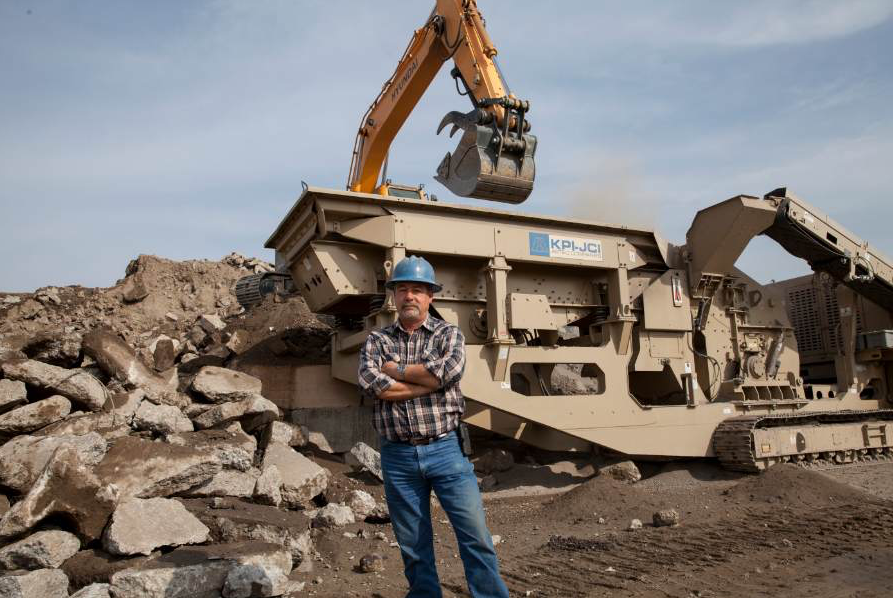
Tyke Van Zandt is the no-nonsense operations manager for FTG Construction Materials, and the man tasked with selecting the crusher that would empower the company’s recycling operations.
“I generally try to buy local,” he said. “I prefer knowing the gentleman’s phone number at home so I can call him at 9 o’clock at night when I have an issue. John has been way above average taking care of everything I need, answering all of my questions and being able to get ahold of him. Anything I need from him, I get it.”
In the short time that he’s owned the FT4250, Van Zandt has already come to appreciate the quick availability of parts and service from Goodfellow Corporation. He recalls one experience when he had an issue with the bolts that hold wedges in place. After calling Harper, he was able to get the part overnighted within 12 hours. It’s this type of service that Van said is important to him as he looks to buy another FT4250 in the future.
“Now, I don’t know what would have happened with other manufacturers, but it’s a lot further to get a part out of Ireland or England than South Dakota. And downtime is your number one concern, in my opinion. If you’re down, you’re not making any money, and if you’re not making any money, you’ve got no business being in business. If you can lessen your downtime in any way, then do so. If that means buying American, then by God buy American.”
